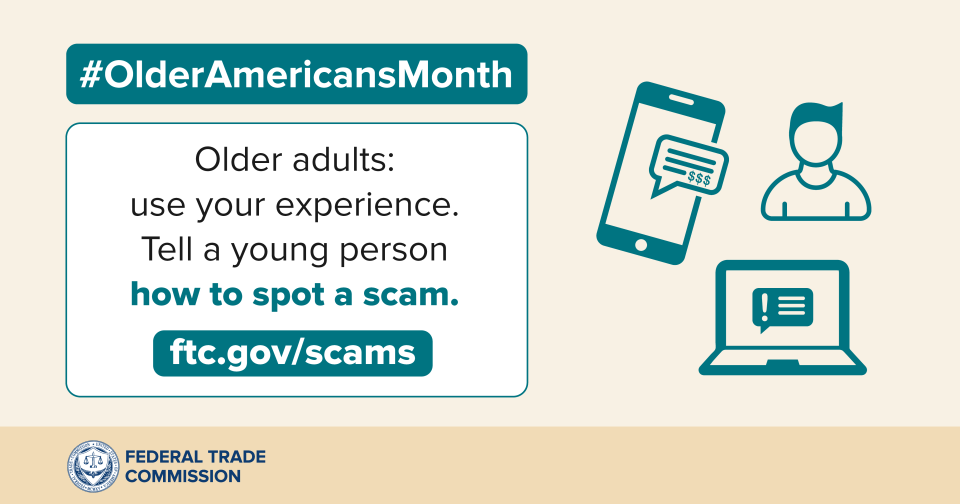Think the techy young people in your life are too techy to be scammed? Think again. According to data from the FTC, people in their twenties reported losing money to fraud at a higher rate than people in their seventies. So, if you count yourself an older adult, let’s use your accumulated knowledge this Older American’s Month. Reach out to the young people in your life to help them better spot and avoid scams. But where to start?
The top scams young people reported include impersonator scams (think somebody pretending to be Amazon), job scams (think “amazing” offers to work from home) and investment scams (think cryptocurrency). Start by reminding them that scams take different twists and turns, but, nearly always, a scammer pretends to be someone you trust to trick you into sending money or personal information. Ask if they’ve seen something like these examples on social media, gaming sites, messaging apps, or somewhere else. And remind them: these are scams.
As you talk, here’s some other advice to share:
Don’t respond to unsolicited offers. If you get an out-of-the-blue call, text, or e-mail that seems to come from an online retailer, your bank, credit card, or a payment app, they’re likely phishing scams. Don’t click links. Don’t respond. Hit block and delete.
Never pay someone who promises a job. No honest employer will ever make you pay for a job. They also won’t send you a check and then tell you to buy supplies, pay for training, or something else — and send back whatever money is left. Those are scams.
Don’t believe promises of guaranteed returns or income. There’s no such thing as an investment with little to no risk: not in cryptocurrency or any other investment. But if someone tells you that, you know they’re a scammer.
Finally, if the young people in your life, or you, spot a scam, report it at ReportFraud.ftc.gov.


Since financial institutions and credit card companies have to reach out to consumers in response to potential fraudulent card activity, advising people to block and delete calls, texts and emails that appear to come from those sources is a little irresponsible. By what other method are those entities supposed to contact their customers to prevent fraudulent card use? You should add to this advice that if you get an out-of-the-blue call, text, or email from your bank or credit card company, you should not respond but should immediately reach out to them at a phone number or email address that you independently obtain to check on your account, in case it is legitimately their fraud department.
But how to warn the young'uns, if they think that us seniors are just a bunch of old foggies? You tell them: it's a SCAM. And they look at you and tell you: whaddaya know? You're old.
Nice article for guidance and precautions against scams.
Thank you, i’m 70 and feel nit up to technology. After reading this i’ll be even more aware then to think i’m over thinking. I did receive a memo from Amazon and I called Amazon and they verified it as a scam. Thant you.
In reply to Thank you, i’m 70 and feel… by Carol Picou
Glen Beck was speaking of the rapid growth of AI which now has the potential to call you and sound just like someone you know. We received a call sounding just like our adult grandson who sounded in distress and need money. Told me how much money he needed, how to go about getting the cash out of the bank and where to meet the magistrate at the courthouse. Cautioned me not to tell his dad. Instead we called the bank about making a withdrawal like this and they told me it was a scam. My friend who lives in another city almost did this because the voiced sounded like me.
This information is very crucial for me and to financially prepare the younger human being for opportunities in managing their money right and profitable